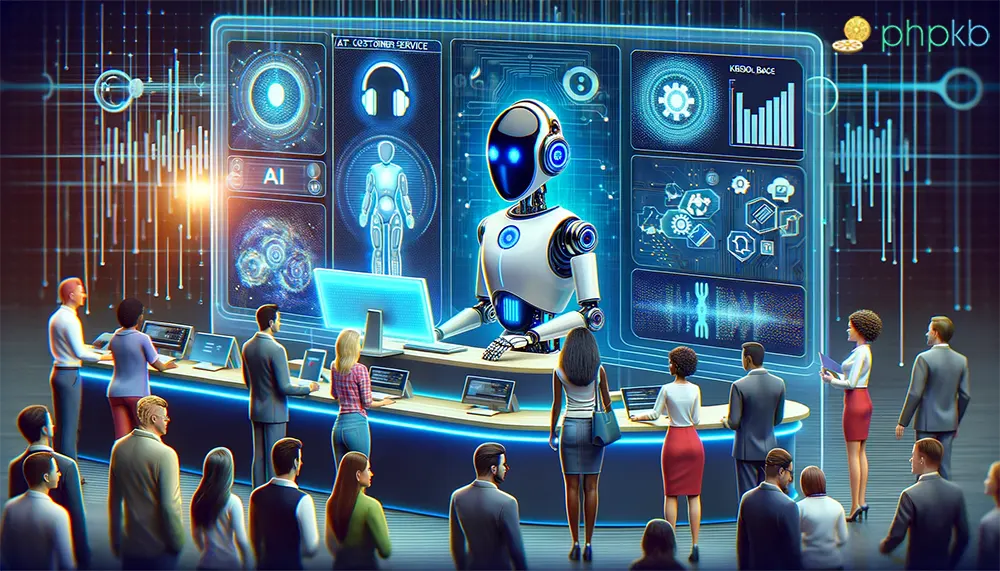AI in Customer Experience: Don’t Get Left Behind
Estimated Reading Time: 3 Minutes
The Integration of Knowledge Bases in Modern Customer Service
In today’s fast-paced digital landscape, artificial intelligence (AI) has emerged as a game-changer, particularly in the realm of customer experience (CX). With customers increasingly expecting quick, personalized, and effective service, businesses can't afford to lag in adopting AI technologies. A key component of this adoption is the strategic use of knowledge bases to enhance customer interactions and satisfaction.
The Rise of AI in Customer Experience
AI’s impact on customer experience is multifaceted, revolutionizing how businesses interact with their customers. From chatbots and virtual assistants to AI-driven analytics, AI tools are not just streamlining operations but are also offering insights into customer behaviors and preferences.
Personalization at Scale: AI systems excel at analyzing vast amounts of data, enabling businesses to offer personalized experiences to customers on a large scale. This personalization can range from product recommendations to tailored customer support.
Efficiency and Availability: AI-powered chatbots and virtual assistants provide 24/7 support to customers, addressing queries and resolving issues faster than ever. This constant availability significantly improves customer satisfaction and loyalty.
Predictive Analysis: AI algorithms can predict customer needs and behaviors, helping companies proactively address potential issues and tailor their strategies to meet evolving expectations.
Knowledge Bases: The Unsung Heroes of Customer Experience
While AI technologies grab the headlines, the role of knowledge bases in customer experience is equally crucial. A knowledge base is a centralized repository of information that can be used to inform customer interactions. When integrated with AI, knowledge bases become powerful tools for enhancing customer service.
Empowering Self-Service: Modern customers often prefer finding answers themselves before reaching out for support. A well-organized, AI-enhanced knowledge base allows customers to easily access information, from FAQs to detailed product guides, facilitating efficient self-service.
Training AI Systems: Knowledge bases provide the foundational data that AI systems require to learn and improve. For instance, AI chatbots trained on a comprehensive knowledge base can provide more accurate and contextually relevant responses to customer queries.
Consistency in Customer Interactions: An AI system armed with a robust knowledge base ensures consistency in customer interactions. Every customer receives the same level of information and quality of service, irrespective of the channel they choose.
Case Studies: Success Stories of AI and Knowledge Bases in Action
Several leading companies have successfully integrated AI and knowledge bases to enhance customer experience.
-
E-commerce Giant: An e-commerce leader used AI to analyze customer queries and feedback stored in their knowledge base to improve product recommendations and search functionality, leading to increased sales and customer satisfaction.
-
Telecom Provider: By implementing an AI-driven chatbot trained on an extensive knowledge base, a telecom company reduced call volumes by 40% and improved first-contact resolution rates.
-
Banking Sector: A major bank utilized AI to personalize financial advice for customers, drawing from a knowledge base of market trends, regulatory information, and customer transaction history.
Overcoming Challenges and Ethical Considerations
While AI in customer experience offers numerous benefits, businesses must navigate certain challenges and ethical considerations.
Data Privacy and Security: As AI systems handle vast amounts of customer data, ensuring privacy and security is paramount. Businesses must adhere to data protection regulations and implement robust security measures.
Bias and Fairness: AI systems can inadvertently perpetuate biases present in their training data. It’s crucial to regularly audit and update the knowledge base to ensure fairness and accuracy in AI decisions.
Human Touch: Despite the efficiency of AI, the human element remains vital in customer experience. Businesses should strike a balance between AI automation and human interaction, especially in complex or sensitive situations.
Conclusion: Embracing AI with a Knowledge-Driven Approach
The integration of AI in customer experience is not just a trend; it's a necessity in the digital age. By leveraging AI in conjunction with comprehensive knowledge bases, businesses can offer superior, personalized, and efficient service to their customers. However, it's essential to navigate this integration thoughtfully, considering ethical implications and maintaining the human touch.
As we move forward, companies that effectively combine AI with robust knowledge management will lead the way in customer experience, staying ahead in an increasingly competitive and technology-driven marketplace.